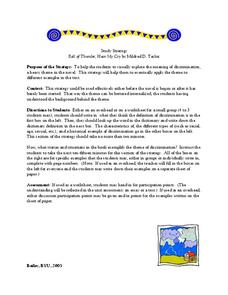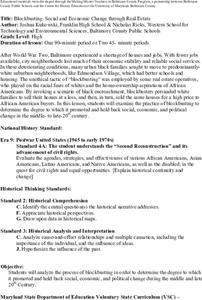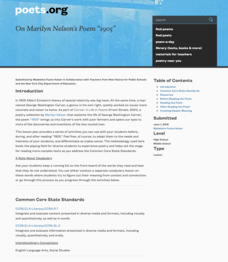North Carolina Consortium for Middle East Studies
Journey of Reconciliation, 1947
After examining the Jim Crow laws and reading primary source materials about the 1947 Journey of Reconciliation, class members create historical markers that honor riders and their journey.
Novelinks
Roll of Thunder, Hear My Cry: Study Strategy
Readers of Roll of Thunder, Hear My Cry expand their understanding of discrimination by using the provided graphic organizer to record the definition of the word, characteristics of and different types of discrimination, as well as...
Partners Against Hate
Building Community and Combating Hate
Put a little love in your classroom! Help middle school scholars understand differences among people and build a sense of community within their school through 10 well-organized lessons. Each unique lesson incorporates writing,...
Core Knowledge Foundation
Ray Charles
Introduce young learners to the read-aloud process with a short biographical passage about Ray Charles. After listening to the passage, class members respond to factual, inferential, and evaluative questions, and then create a timeline...
PBS
Ken Burns: Jackie Robinson Integration or Separation?
What happens when change you imagined, the change you were promised, is slow in coming or doesn't happen at all? What do you do with the frustration and disenchantment? Class members watch two clips from the Ken Burns: Jackie Robinson...
National Park Service
Teaching with Historic Places: Discover the Jackie Robinson Ballpark
Can sports and popular culture change public opinion? That's the essential question asked by a lesson plan that looks at the role Jackie Robinson's appearance at City Island Ballpark in Daytona Beach, Florida played in the desegregation...
Teaching Tolerance
Using Photographs to Teach Social Justice | Exposing Anti-Immigration Sentiment
The debate about immigration reform continues. To gain a deeper understanding of the issues involved, class members first examine a photo of an anti-immigration rally. Groups then conduct an internet search for an image that presents an...
Facing History and Ourselves
Protesting Discrimination in Bristol
Using the Bristol Bus Boycott as a case study, class members examine the strategies and levels of power protesters used to effect change. The two-day instructional activity concludes with individuals reflecting on the actions they might...
Facing History and Ourselves
Blending In and Standing Out
An excerpt from Sarfraz Manzoor's memoir about how his experiences as a Pakistani growing up in England shaped the way he though about his identify provides a stimulus for a discussion of how experiences can shape our concept of identity...
Facing History and Ourselves
Defining Our Obligations to Others
Introduce young learners to the concept of a Universe of Obligation, a term coined by sociologist Helen Fein, with a lesson that asks learners to consider the extent to which they feel a responsibility for others. Class members read and...
Center for History Education
Japanese American Internment During World War II
World War II turned nations against each other and neighbors into enemies. An eye-opening lesson explores the dark past of Japanese-American internment camps during WWII. Scholars learn of the fear and distrust toward Asian Americans...
Center for History Education
Contextualizing a Historical Photograph: Busing and the Anti-busing Movement in Boston
The anti-busing movement in Boston is the focus of a lesson that asks young historians to examine primary source documents to identify the causes and consequences of busing pupils from one area of the city to another in the attempt to...
Center for History Education
Blockbusting: Social and Economic Change through Real Estate
"Redlining," "Blockbusting," and "White Flight" may not be terms familiar to young historians. Here's a lesson that introduces middle schoolers to these terms and the actions associated with them. Class members examine a series of...
Newseum
Recognizing Bias: Analyzing Context and Execution
Young journalists learn how to identify bias in the news media. First, they watch a video in which a Newseum expert identifies bias in a story about the 1919 Chicago race riots. They then use what they have learned to analyze a recent...
Academy of American Poets
The African American Experience
Disrespect can be as subtle as a frown or a turn of a head. To prepare for a study of Toi Derricote's poem "The Weakness" class members create wordless skits that demonstrate subtle or not so subtle signs of disrespect. After a...
Academy of American Poets
Teach This Poem: "A Place in the Country" by Toi Derricotte
Build young scholars' confidence in analyzing art and poetry with a lesson that first asks pupils to list details they notice in Edouard Vuillard's painting "Garden at Vaucresson" and then to describe how the painting makes them feel....
Academy of American Poets
On Marilyn Nelson's Poem “1905”
Marilyn Nelson's poem, "1905," asks young scholars to compare and contrast George Washington Carver and Albert Einstein. After studying images of the two scientists and listing their observations, class members listen to several readings...
Anti-Defamation League
Shirley Chisholm: Unbought, Unbossed and Unforgotten
A 13-page packet introduces high schoolers to a lady of amazing firsts. Shirley Chisholm was the first Black woman elected to Congress, the first Black woman to run for President of the United States, and a leader of the Women's Rights...
Anti-Defamation League
Building Alliances
Bystander or up-stander? The final instructional activity in the "Looking Back Reaching Forward" unit asks participants to consider how they can become involved in encouraging change in their school and community.
Anti-Defamation League
The Road to Brown
As part of the study of segregation in U.S. schools, scholars research and create a timeline of events that led to the historic Supreme Court case, Brown V. Board of Education. Groups research a topic or event that led to the decision,...
Anti-Defamation League
With All Deliberate Speed
Has the integration of U.S. schools proceeded "with all deliberate speed?" Has progress been made? Those are the questions young historians must consider as they examine the barriers to and opportunities revealed in a study of timelines...
Anti-Defamation League
Addressing Hate Online: Countering Cyberhate with Counterspeech
Cyberbullying is the focus of much discussion. Here's a lesson that offers suggestions for addressing cyberhate. After groups examine different examples of cyberhate, the class adds their suggestions to a list of ideas for how to counter...
Anti-Defamation League
Hair Discrimination and the CROWN Act
The CROWN Act (Creating a Respectful and Open World for Natural Hair) is the subject of the lesson that asks groups to research the stories of five different women and share their insights in a jigsaw activity. Participants then craft...
PBS
History of Juneteenth and Why It’s Now a National Holiday
June 19 is now a United States federal holiday. Young historians examine the background of the first Juneteenth celebrations and why on June 15, 2021, Congress finally approved "Juneteenth National Independence Day" as a federal holiday.
Other popular searches
- Racism and Prejudice
- Pshe Racism and Prejudice
- She Racism and Prejudice
- Prejudice Racism and Bigotry

























